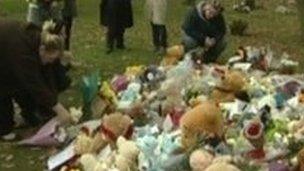Social workers fear service cuts risk children's lives
- Published

Laying flowers in memory of Baby Peter. Now social workers say service cuts risk more children's lives.
Some 88% of social workers think cuts are putting vulnerable children's lives at risk, a survey suggests.
And 54% of the 1,100 UK social workers questioned by the British Association of Social Workers (BASW) said their caseloads were "unmanageable".
The BASW says it shows the system is in a "dire" state and at "breaking point" - five years after the Baby P tragedy.
The government said it was cutting red tape to make it easier for social workers to get on with their jobs.
'Cleaning toilets'
Baby Peter Connolly - who became known as Baby P - was 17 months old when he was found dead with more than 50 injuries at his mother's home in Tottenham, north London. He had been on the at-risk register and received 60 visits from social workers, police and health professionals over eight months.
His mother and two men were jailed in 2009 but the case sparked widespread criticism of social services in Haringey, north London.
The British Association of Social Workers claims that "despite political pledges to protect front-line services, government cuts have left social workers drowning in paperwork, acting as receptionists and even cleaning toilets, instead of working to prevent further tragedies".
BASW chief executive Hilton Dawson said: "The government pledged in 2010 to protect front-line social workers, yet by axing support staff they have turned social workers into glorified typists.
"We cannot afford to wait any longer for urgent action from government. Lives that could be helped will be neglected and lives that could quite literally be saved will be lost unless the response is swift and total.
"Social workers are facing an administrative overload and as a result are spending less and less time with vulnerable children and adults.
"Caseloads are quite simply unmanageable, posing imminent and serious risks to the people who need services.
"The stresses on service providers, from the very top to the bottom, are creating an endemic culture of bullying, driving morale levels through the floor."
The survey suggested 85% of social workers had seen cuts to services within the last year, 77% were concerned about caseloads, 65% worried about the use of unqualified staff and 46% were afraid to speak out.
One social worker with 20 years of experience told BBC News there had been a steady increase in the number of cases referred for social work since the Baby P tragedy, but cuts in staffing and an administrative overload meant the service barely coped.
The man, who asked to remain anonymous, said his current caseload ran to over 50 families.
'Unsafe workload'
"It's really amazing to me that there hasn't been another national case like Peter Connolly's... because caseloads are really high.
"Social workers can only work effectively if they can put the proper time into working with one family.
"It isn't feasible to put in that level of work when we have... over 50 cases at a time. That's an unsafe workload for staff working in child protection."
He added that a heavy burden of paperwork meant that despite long hours he felt overwhelmed and ineffective.
"I think the general public would be really surprised to see how much administration and paper work social workers have to do.
"They expect us to be out talking to children and families not sitting for massive periods at computers.
"The consequences are that we are not dealing with issues to prevent crises happening in families."
In a statement the Department for Education said: "We are now implementing major child protection reforms to cut the red tape and free social workers to get on with their job instead of being buried in paperwork.
"We're investing £4bn nationally over two years in children's services and we've given local authorities complete freedom over their budgets so they can target children most at risk and protect them from harm.
"It is a false economy for councils not to make this a priority because society will pay much more further down the line if children don't get the support they need as early as possible."
- Published14 May 2012
- Published30 January 2012
- Published1 February 2011
- Published15 September 2010